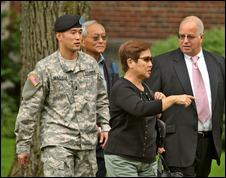Iraq war bashed at hearing for soldier who wouldn't go

http://seattletimes.nwsource.com/html/localnews/2003207442_watada18m.html
Friday, August 18, 2006 - Page updated at 12:00 AM
E-mail article Print view
Iraq war bashed at hearing for soldier who wouldn't go
By Hal Bernton
Seattle Times staff reporter
PREV of NEXT
Army 1st Lt. Ehren Watada has been charged.
Related
Archive Officer at Fort Lewis calls Iraq war illegal, refuses order to go
FORT LEWIS — The Iraq war came under attack Thursday in an unusual place: a wood-paneled hearing room at this Army base that has sent thousands of soldiers to the conflict.
Army 1st Lt. Ehren Watada's refusal to serve in Iraq triggered the one-day legal proceeding that is a likely prelude to a court-martial. Most of the hearing was consumed by defense testimony, with three witnesses attacking the Bush administration's approach to the war and asserting that an officer could justifiably refuse to participate.
"There was no authorization from the U.N. Security Council ... and that made it a crime against the peace," said Francis Boyle, a University of Illinois professor of international law, who said the Army's own field manual required such authorization for an offensive war.
Watada, 28, refused to deploy to Iraq with his Fort Lewis-based Stryker unit June 22 and has made numerous statements denouncing the war and the conduct of the Bush administration. In a nation increasingly divided over the course of the war, Watada's actions have been hailed as heroic by some and denounced by others as a disgrace to the Army uniform.
In July, the Army charged the Honolulu man with missing his brigade's movement to Iraq, twice speaking contemptuously of the president and committing three acts unbecoming an officer. Watada could face seven years in prison if found guilty of those charges at a court-martial.
At Thursday's hearing, the prosecuting officer introduced new evidence against the lieutenant: a recording of Watada's speech Saturday at the Veterans for Peace convention in Seattle, where he lashed out at the administration for waging a war of choice "for profit and imperialistic domination," and urged soldiers to lay down their arms and refuse to fight.
"Resisting an authoritarian government at home is equally important to fighting a foreign aggressor on the battlefield," Watada said.
Watada's attorney said such statements are free speech protected under the U.S. Constitution. The American Civil Liberties Union (ACLU) also submitted a brief in support of Watada's right to speak.
Lt. Col. Mark Keith, the investigating officer who presided over Thursday's Article 32 hearing, will make a recommendation about whether to proceed with a court-martial.
In response to defense questions, Keith affirmed he was open to considering arguments about the war's legality and allowed Boyle, former United Nations Undersecretary Denis Halliday and retired Col. Ann Wright to speak about the legality and conduct of the war.
');
-->
on error resume next
MM_FlashCanPlay = ( IsObject(CreateObject("ShockwaveFlash.ShockwaveFlash." & MM_contentVersion)))
Boyle, an outspoken critic of the administration policy in Iraq, went into considerable detail about the rules for war as detailed in the Army Field Manual. He accused the administration of using fraudulent means to persuade Congress to authorize the war, twice-failing to get U.N. Security Council authorization for the war and then allowing war crimes to occur.
Keith listened, his finger on his chin.
In questioning, he appeared skeptical.
"I am struggling with the connection between what you have just discussed ... and how that relates to Lt. Watada," Keith told Boyle at one point during the professor's testimony.
The Army prosecutor, Capt. Dan Kuecker, said it was not up to the Army to determine the legality of the war and noted that no U.S. court had ruled it was illegal.
He objected to Boyle's testimony on the grounds that it lacked relevance and included hearsay and speculation.
Though Keith could recommend a dismissal of all or some of the charges, most Article 32 hearings lead to court-martial hearings, according to Eric Seitz, a civilian attorney assisting in Watada's defense.
Seitz said it is uncertain whether the defense witnesses who testified Thursday would be able to testify during the court-martial. That would depend on rulings during the trial.
But Seitz said that arguments about the legality — and conduct — of the war were crucial to the defense and would need to be raised to gain Watada a fair trial.
If there is a court-martial, Watada could choose to have the case heard by a military judge or a panel of military-service members.
Hal Bernton: 206-464-2581 or hbernton@seattletimes.com
Information from The Associated Press is include in this report.
Copyright © 2006 The Seattle Times Company

0 Comments:
Post a Comment
<< Home